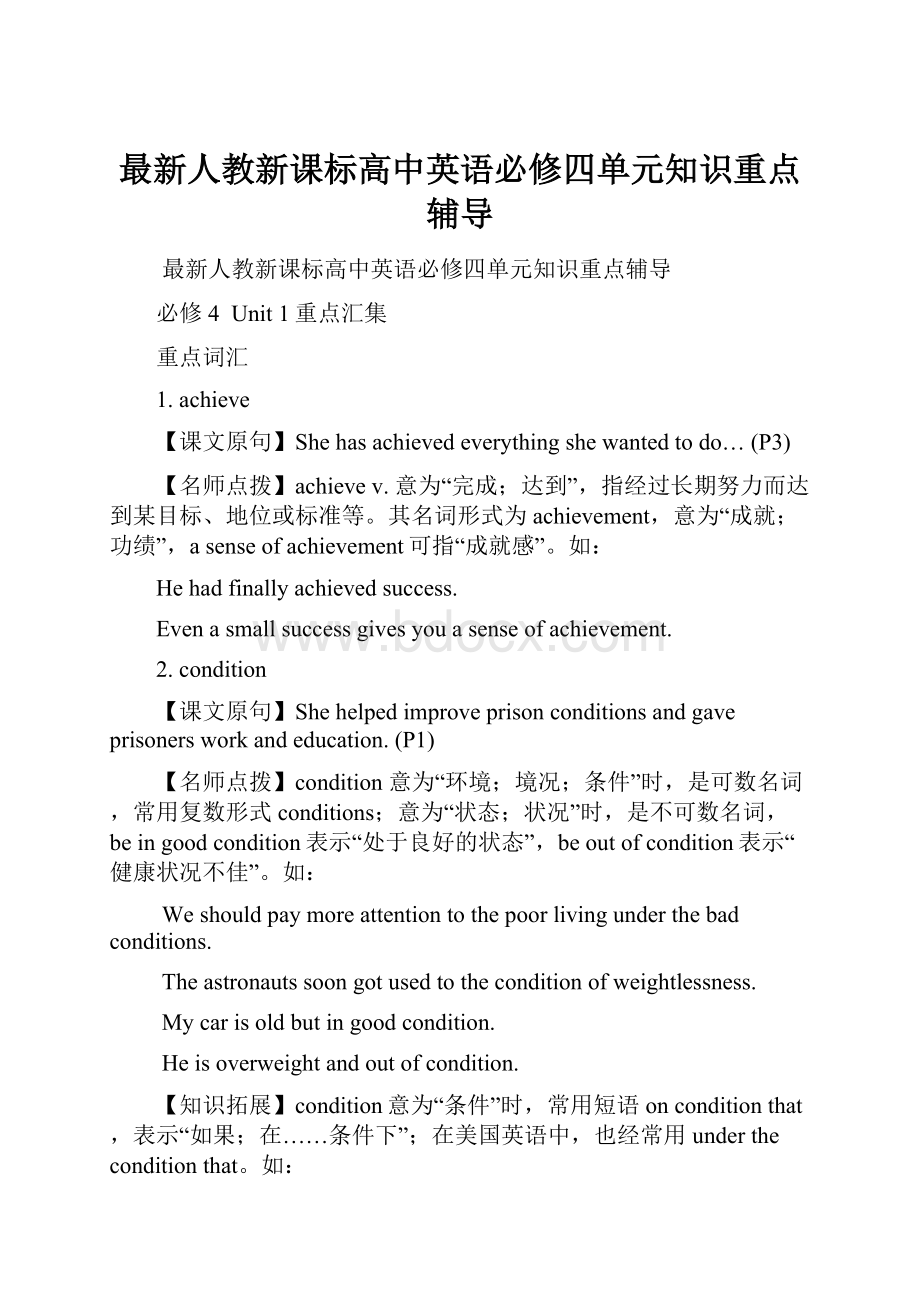最新人教新课标高中英语必修四单元知识重点辅导.docx
《最新人教新课标高中英语必修四单元知识重点辅导.docx》由会员分享,可在线阅读,更多相关《最新人教新课标高中英语必修四单元知识重点辅导.docx(25页珍藏版)》请在冰豆网上搜索。

最新人教新课标高中英语必修四单元知识重点辅导
最新人教新课标高中英语必修四单元知识重点辅导
必修4Unit1重点汇集
重点词汇
1.achieve
【课文原句】Shehasachievedeverythingshewantedtodo…(P3)
【名师点拨】achievev.意为“完成;达到”,指经过长期努力而达到某目标、地位或标准等。
其名词形式为achievement,意为“成就;功绩”,asenseofachievement可指“成就感”。
如:
Hehadfinallyachievedsuccess.
Evenasmallsuccessgivesyouasenseofachievement.
2.condition
【课文原句】Shehelpedimproveprisonconditionsandgaveprisonersworkandeducation.(P1)
【名师点拨】condition意为“环境;境况;条件”时,是可数名词,常用复数形式conditions;意为“状态;状况”时,是不可数名词,beingoodcondition表示“处于良好的状态”,beoutofcondition表示“健康状况不佳”。
如:
Weshouldpaymoreattentiontothepoorlivingunderthebadconditions.
Theastronautssoongotusedtotheconditionofweightlessness.
Mycarisoldbutingoodcondition.
Heisoverweightandoutofcondition.
【知识拓展】condition意为“条件”时,常用短语onconditionthat,表示“如果;在……条件下”;在美国英语中,也经常用undertheconditionthat。
如:
IwillcomeonconditionthatPeterisinvited.
Theyagreedundertheconditionthatthematterbedealtwithquickly.
3.devote
【课文原句】ShedevotedallherlifetomedicalworkforChinesewomenandchildren.(P1)
【名师点拨】devotevt.意为“投入于;献身”,其宾语后常与介词to搭配,to后接名词、代词或动名词。
devote…to…意为“献身;致力于”,指把自己、时间、精力等奉献给某种工作或事业。
如:
Hehasdevotedhiswholelifetobenefitingmankind.
Thegirl,towhomhewasdevoted,diedinatrafficaccidentbychance.
Afterhehasretired,hewilldevotehimselftogardening.
4.behave
【课文原句】Janehasstudiedtheseanimalsformanyyearsandhelpedpeopleunderstandhowmuchtheybehavelikehumans.(P2)
【名师点拨】behavevi&vt.意为“举动;举止;行为表现”,如behavewell/badly等。
其名词形式为behaviour,指“行为;态度;举止”。
如:
Theparentsencouragedthechildrentobehavewellinfrontoftheguests.
Mycamerahasbeenbehavingwellsinceitwasrepaired.
Everyonepraisesthechildren'sgoodbehaviour.
5.worthwhile
【课文原句】Buttheeveningmakesitallworthwhile.(P2)
【名师点拨】worthwhileadj.意为“值得做的;值得出力的”,可作表语或定语。
beworthwhiletodo/doingsth表示“值得做……”,在动词-ing形式的结构中,worthwhile有时可以用来替代worth,特别是在表示“值得花时间”这一概念时。
如:
Ithinkteachingschoolisalwaysaworthwhilejob.
Thebookreferredtobytheprofessorisworthwhile/worthreading.
6.observe
【课文原句】Janespentmanyyearsobservingandrecordingtheirdailyactivities.(P2)
【名师点拨】observevt.意为“观察;观测;遵守”,可用observesbdosth,observe+that从句。
其名词形式为observation。
如:
Iobservedthemanwhomurderedtheboyentertheshop.
Heobservedthatweshouldprobablyhaverain.
Mostinformationwascollectedbydirectobservationoftheanimals’behaviour.
7.argue
【课文原句】Shehasarguedforthemtobeleftinthewildandnotusedforentertainmentoradvertisements.(P2)
【名师点拨】argue作动词时,意为“争论;争吵;争辩”。
arguefor意为“为……辩护”;arguewithsbabout/oversth指“就某事和某人争论”;argueagainst意为“据理反对;争辩……”。
如:
Itisnousearguingfortheplanbecauseithasbeenrejected.
Wearealwaysarguingwitheachotheraboutmoney.
Fatherarguedfiercelyagainstanyincreaseinexpenditureforthechildren’sannualparty.
【知识拓展】argue的名词形式为argument,意为“争论;争端;论证”,常构成短语settleanargument指“解决争端”。
9.carefor
【课文原句】Itwasasmallbookexplaininghowtocutthedeathratefromhavingandcaringforbabiesbyfollowingsomerulesforkeepingbabiescleanandhealthy.(P6)
【名师点拨】carefor可以表示lookafter的意思,意为“照顾;照料”,且较正式;也可表示“喜欢”的意思。
如:
Hissoncaredforhimwhenhewasill.
Infact,Idon’treallycareforbasketball.
另外,在上面的句子中,explain意为“解释,说明”,后可接名词、代词、从句或wh+todo作宾语,可用explainsthtosb或explaintosbsth。
如:
Willyouexplaintoushowwecanfinishtheworkassoonaspossible?
【知识拓展】careabout意为“介意;在乎”,表示是否认为某事是重要的,某事是否引起了某人的兴趣或使其忧虑。
最常用于疑问句或否定句中。
about用在宾语前面,但是在连词前面一般省掉。
Idon’tcareaboutyouropinion.
Idon’tcarewhetheritrains—I’mhappy.
10.intend
【课文原句】Ilookedcarefullyatthetextandrealisedthatitwasintendedforwomenwholivedinthecountryside.(P6)
【名师点拨】intendv.意为“打算;计划;想要”。
intendtodosth意为“想干某事”;intend后也可以接动词-ing形式或that从句。
intendfor表示“原打算给某人;准备让……干……”。
如:
Iintendedtocometoyourhouselastnightbutitrained.
Iintendcoming/tocomebacksoon.
Hehadn’treallyintendedthattheyshouldbethere.
Thisgiftisintendedforyou.
热点语法
主谓一致用法难点小结:
一、集合名词作主语时的主谓一致。
1.集合名词有family,team,group,party,class,public,club,crew,crowd,enemy,audience,company,committee,government,population等,当被看作一个整体时,表示单数意义,谓语动词用单数形式;如果这些集合名词指其中的每个成员,表示复数意义,谓语动词则用复数形式。
即谓语动词的单复数要与主语的含义相一致。
如:
Myclassisabigone,includingthirtyboysandthirtygirls.
Myclassareworkinghardforthecomingexam.
2.有些集合名词作主语时,谓语只能用复数形式,如:
people,thepolice,themilitary,mankind,cattle等。
如:
Thepolicearesearchingforthelostchild.
二、不定代词作主语时的主谓一致。
不定代词anyone,anybody,anything,everyone,everybody,everything,someone,somebody,noone,nobody,nothing,each,theother等作主语时,谓语动词用单数。
如:
Everythinggoeswellwithme.
EachofthestudentsinourclasshasanEnglish-Chinesedictionary.
三、“名词+名词”作主语时的主谓一致。
当表示同一人物或观点时,谓语动词用单数。
如:
Anovelistandplaywrightiscomingtoourschool.这里表示“一位小说家兼剧作家”,是同一个人,所以谓语动词用单数。
如果是Anovelistandaplaywright作主语,这时表示“一位小说家和一位剧作家”,是两个人,所以谓语动词用复数,该句应改为:
Anovelistandaplaywrightarecomingtoourschool.
四、The+adj.作主语时的主谓一致。
当The+adj.表示抽象的含义时,谓语动词用单数。
如:
Thebeautifulisthetrue.
当The+adj.表示该类全体的含义时,谓语动词用复数。
如:
Therichshouldhelpthepoor.
Unit2重难点解析
1.AlthoughheisoneofChina’smostfamousscientists,YuanLongpingworksthelandtodohisresearch.(Reading)
此句中work为及物动词,意为“耕种(土地)”。
如:
Theyareworkingthelandtogether.
他们一起在田间耕作。
work作及物动词,还有“使工作;开动;创造(奇迹);经营(工厂、农场等)”等意;作不及物动词,意为“工作;(机器等)开动;(办法、计划等)行得通”等。
如:
Heworkshisemployeeslonghours.
他使他的员工长时间地工作。
Doyouknowhowtoworkthismachine?
你知道怎样开动这台机器吗?
Thisshowsthatmancanworkwonders.
这说明人类可以创造奇迹。
Idon’tthinkthatyoursuggestionwillwork.
我认为你的建议行不通。
2.Sohegivesmillionsofyuantoequipothersfortheirresearchinagriculture.(Reading)
equip为及物动词,在此作“使有能力;使有资格;赋予”解。
该词本意为“装备;配备”,后接宾语+介词for或with短语。
如:
Wemustequipthearmyforthemodernwar.
我们必须装备军队打现代化战争。
Ourlibraryiswellequippedwithmodernfacilities.
我们的图书馆装备着现代化的设施。
Acollegedegreemadehimwellequippedforteaching.
大学文凭使他完全有资格任教。
Yourtrainingwillequipyouforyourfuturejob.
你受过的训练将能够使你胜任将来的工作。
3.NowDrYuanhasanotherdream:
toexporthisricesothatitcanbegrownallovertheworld.(Reading)
此句中another作形容词,指不定范围的“另一个的,又一”,后加单数可数名词;但若another后跟few或数词时,则与复数名词连用。
another也可作代词,表示“另一个”。
如:
There’sanotherthingIwanttotellyou.
我还有一件事想告诉你。
There’sroomforanotherfewpeopleinthebackofthebus.
公共汽车后面还能坐下几个人。
Idon’tlikethisone;pleaseshowmeanother.
我不喜欢这个,请另拿一个给我看看。
4.Whenfarmersusethiskindofnaturalfertilizertheykeeptheair,soilandwateraswellasthefoodsupplyfreefromchemicals. (UsingLanguage)
freefrom意为“没有;不受……损害的”。
如:
acityfreefromthieves
无贼的城市
adayfreefromwind
无风的一天
Youarefreefromblame.
你没有过错。
Iamfreefromcare.
我没有烦恼。
Thishouseisfreefromflies. 这个房子没有苍蝇。
点击-ing形式作宾语
1.It’shardtoimagine______anywhereelsebuthere.
A.live B.tolive
C.living D.toliving
此题选C。
英语中,有些动词(短语)一般跟-ing形式作宾语,而不用不定式作宾语。
这类动词(短语)包括:
advise,allow,avoid,consider(考虑),enjoy,escape,finish,imagine,mind,miss,practise,risk,suggest,feellike,insiston等。
2.Havingbeenillinbedfornearlyamonth,hehadahardtime______theexam.
A.pass B.topass
C.passed D.passing
此题选D。
haveahardtime(in)doing意为“费了很大劲做”,-ing形式作介词的宾语。
此句中省略了介词in,增加了试题的难度。
类似的结构还有:
spend...(in)doing花费……做
havedifficulty/trouble(in)doing 做……有困难
stop/prevent...(from)doing阻止……做
wastetime(in)doing浪费时间做
excuse...(for)doing原谅……做
bebusy(in)doing忙于做
3.Shelooksforwardeveryspringto_____theflower-linedgarden.
A.visit B.payingavisit
C.walkin D.walkingin
此题选D。
许多含有to的短语动词中的to为介词,其后若跟动词,应用其-ing形式作宾语。
这类短语有:
lookforwardto, be(get)used to(习惯于),devote...to..., leadto, payattentionto,prefer...to..., stickto等。
4.—Thelightintheofficeisstillon.
—Oh,Iforgot____.
A.turningitoff B.turnitoff
C.toturnitoff D.havingturneditoff
此题选C。
有些动词既可跟-ing形式也可跟不定式作宾语,但含义不同。
如:
(1)forget,remember后跟-ing形式表示已发生的动作,跟不定式表示未发生的动作。
(2)trytodo尽力做;trydoing试着做
(3)goontodo 接着做(另一件事);
goondoing 继续做(原来在做的事)
(4)meantodo 打算做;
meandoing意味着
(5)can’thelptodo不能帮助做;
can’thelpdoing禁不住做
(6)stoptodo停下来去做;
stopdoing停止做
5.—Whatdoyouthinkofthebook?
—Oh,excellent.It’sworth______asecondtime.
A.toread B.toberead
C.reading D.beingread
此题选C。
beworth后常跟-ing形式的主动式作宾语,表示被动意义。
6.Thissentenceneeds______.
A.aimprovement
B.improve
C.improving
D.improved
此题选C。
need后常跟-ing形式的主动式或不定式的被动式,表示被动意义。
该句相当于Thissentenceneedstobeimproved.
Unit3AtasteofEnglishhumor
一、日常口语突破
情感
(1)—Whatdoyouthinkofthelecture?
你认为那讲座如何呀?
—Howwonderful.好极了。
(2)—Thepartyissofun.晚会是那么有趣。
—I’mpleasedyouareamusedatit.很高兴你被它逗乐了。
二、核心单词例析
1.astonishvt使惊讶(=surprisesb.greatly)
Theearthquakeastonishedthewholecountry.这次地震震惊了全国。
辨析:
astonishingadj.令人震惊的;astonishedadj.感到惊呀的
2.particular非一般的,特别的,特殊的
Heleftfornoparticularreason.他无缘无故就走了。
ToJane,herdiaryisaparticularfriend.对简来说,日记是她的特殊朋友。
搭配:
inparticular=especially特别是
3.entertainvt.&vi.使欢乐,招待,款待
Wewereallentertainedbyhishumorousstories.他的幽默故事使我们大家都很开心。
Theyoftenentertainedtheirfriendsatweekends.他们常在周末招待朋友。
Idon’tentertainveryoften.我不常在家请客.
派生:
entertainingadj.使人愉快的,有趣:
hisentertainingsilentmovies他那逗乐的无声电影,anentertainingstory/guess一个有趣的故事/客人。
4.throughoutprep.遍及,贯穿adv.到处,始终,全部
Itrainedthroughoutthenight.雨下了一整夜。
Iwatchedthefilmandcriedthroughout.我看那个电影时从头哭到尾。
5.failuren.失败(不可数);失